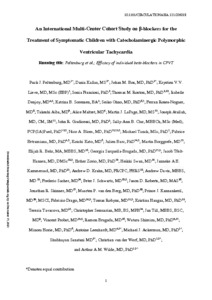Peltenburg, PJ;
Kallas, D;
Bos, JM;
Lieve, KVV;
Franciosi, S;
Roston, TM;
Denjoy, I;
Sorensen, KB;
Ohno, S;
Roses-Noguer, F;
et al.
Peltenburg, PJ; Kallas, D; Bos, JM; Lieve, KVV; Franciosi, S; Roston, TM; Denjoy, I; Sorensen, KB; Ohno, S; Roses-Noguer, F; Aiba, T; Maltret, A; LaPage, MJ; Atallah, J; Giudicessi, JR; Clur, S-AB; Blom, NA; Tanck, M; Extramiana, F; Kato, K; Barc, J; Borggrefe, M; Behr, ER; Sarquella-Brugada, G; Tfelt-Hansen, J; Zorio, E; Swan, H; Kammeraad, JAE; Krahn, AD; Davis, A; Sacher, F; Schwartz, PJ; Roberts, JD; Skinner, JR; van den Berg, MP; Kannankeril, PJ; Drago, F; Robyns, T; Haugaa, KH; Tavacova, T; Semsarian, C; Till, J; Probst, V; Brugada, R; Shimizu, W; Horie, M; Leenhardt, A; Ackerman, MJ; Sanatani, S; van der Werf, C; Wilde, AAM
(2022)
An International Multicenter Cohort Study on β-Blockers for the Treatment of Symptomatic Children With Catecholaminergic Polymorphic Ventricular Tachycardia.
Circulation, 145 (5).
pp. 333-344.
ISSN 1524-4539
https://doi.org/10.1161/CIRCULATIONAHA.121.056018
SGUL Authors: Behr, Elijah Raphael
![[img]](https://openaccess.sgul.ac.uk/113944/1.hassmallThumbnailVersion/CIRCULATIONAHA.121.056018.pdf)  Preview |
|
PDF
Accepted Version
Available under License ["licenses_description_publisher" not defined].
Download (1MB)
| Preview
|
Abstract
Background:
Symptomatic children with catecholaminergic polymorphic ventricular tachycardia (CPVT) are at risk for recurrent arrhythmic events. β-Blockers decrease this risk, but studies comparing individual β-blockers in sizeable cohorts are lacking. We aimed to assess the association between risk for arrhythmic events and type of β-blocker in a large cohort of symptomatic children with CPVT.
Methods:
From 2 international registries of patients with CPVT, RYR2 variant–carrying symptomatic children (defined as syncope or sudden cardiac arrest before β-blocker initiation and age at start of β-blocker therapy <18 years), treated with a β-blocker were included. Cox regression analyses with time-dependent covariates for β-blockers and potential confounders were used to assess the hazard ratio (HR). The primary outcome was the first occurrence of sudden cardiac death, sudden cardiac arrest, appropriate implantable cardioverter-defibrillator shock, or syncope. The secondary outcome was the first occurrence of any of the primary outcomes except syncope.
Results:
We included 329 patients (median age at diagnosis, 12 [interquartile range, 7–15] years, 35% females). Ninety-nine (30.1%) patients experienced the primary outcome and 74 (22.5%) experienced the secondary outcome during a median follow-up of 6.7 (interquartile range, 2.8–12.5) years. Two-hundred sixteen patients (66.0%) used a nonselective β-blocker (predominantly nadolol [n=140] or propranolol [n=70]) and 111 (33.7%) used a β1-selective β-blocker (predominantly atenolol [n=51], metoprolol [n=33], or bisoprolol [n=19]) as initial β-blocker. Baseline characteristics did not differ. The HRs for both the primary and secondary outcomes were higher for β1-selective compared with nonselective β-blockers (HR, 2.04 [95% CI, 1.31–3.17]; and HR, 1.99 [95% CI, 1.20–3.30], respectively). When assessed separately, the HR for the primary outcome was higher for atenolol (HR, 2.68 [95% CI, 1.44–4.99]), bisoprolol (HR, 3.24 [95% CI, 1.47–7.18]), and metoprolol (HR, 2.18 [95% CI, 1.08–4.40]) compared with nadolol, but did not differ from propranolol. The HR of the secondary outcome was only higher in atenolol compared with nadolol (HR, 2.68 [95% CI, 1.30–5.55]).
Conclusions:
β1-selective β-blockers were associated with a significantly higher risk for arrhythmic events in symptomatic children with CPVT compared with nonselective β-blockers, specifically nadolol. Nadolol, or propranolol if nadolol is unavailable, should be the preferred β-blocker for treating symptomatic children with CPVT.
| Item Type: |
Article
|
| Additional Information: |
This is a non-final version of an article published in final form in Peltenburg, PJ; Kallas, D; Bos, JM; Lieve, KVV; Franciosi, S; Roston, TM; Denjoy, I; Sorensen, KB; Ohno, S; Roses-Noguer, F; et al. (2022) An International Multi-Center Cohort Study on β-blockers for the Treatment of Symptomatic Children with Catecholaminergic Polymorphic Ventricular Tachycardia. Circulation, 145 (5). pp. 333-344. |
| Keywords: |
Cardiovascular System & Hematology, 1103 Clinical Sciences, 1102 Cardiorespiratory Medicine and Haematology, 1117 Public Health and Health Services |
| SGUL Research Institute / Research Centre: |
Academic Structure > Molecular and Clinical Sciences Research Institute (MCS) |
| Journal or Publication Title: |
Circulation |
| ISSN: |
1524-4539 |
| Language: |
eng |
| Publisher License: |
Publisher's own licence |
| Projects: |
| Project ID | Funder | Funder ID |
|---|
| 113304045 | ZonMW | UNSPECIFIED | | G-19-0024239 | Heart and Stroke Foundation | UNSPECIFIED | | G-15-0008870 | Heart and Stroke Foundation | UNSPECIFIED | | RN380020 – 406814 | Canadian Institute of Health Research | UNSPECIFIED | | 1154992 | National Health and Medical Research Council | http://dx.doi.org/10.13039/501100000925 | | PT17/0015/0043 | FEDER Union Europea | UNSPECIFIED | | ANR-19-CE14-0031-001 | Agènce Nationale de la Recherche | UNSPECIFIED | | 00064203 | Ministry of Health, Czech Republic | UNSPECIFIED | | JP18ek0109202 | Japan Agency for Medical Research and Development | UNSPECIFIED |
|
| PubMed ID: |
34874747 |
| Dates: |
| Date |
Event |
| 2022-02-01 |
Published |
| 2021-12-07 |
Published Online |
| 2021-11-01 |
Accepted |
|
 |
Go to PubMed abstract |
| URI: |
https://openaccess.sgul.ac.uk/id/eprint/113944 |
| Publisher's version: |
https://doi.org/10.1161/CIRCULATIONAHA.121.056018 |
Statistics
Item downloaded times since 17 Dec 2021.
Actions (login required)
 |
Edit Item |



